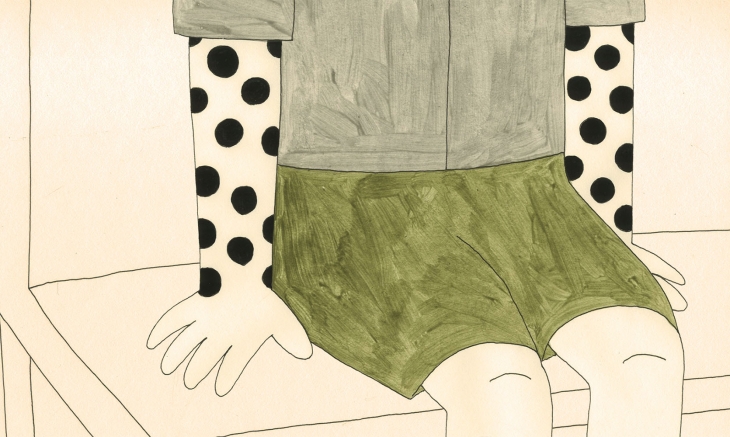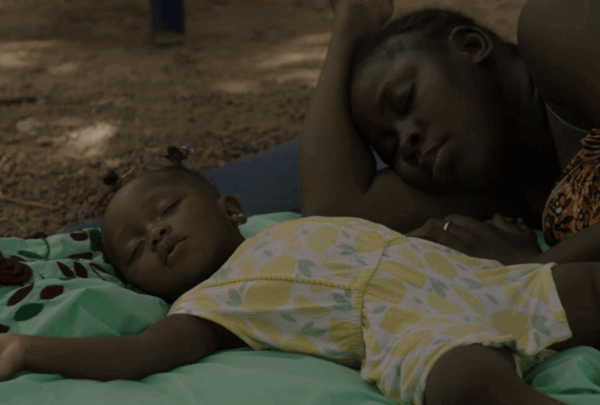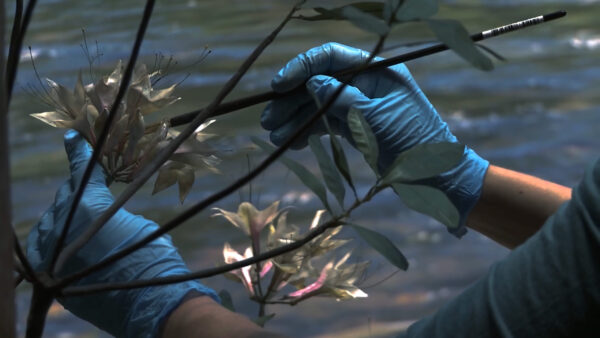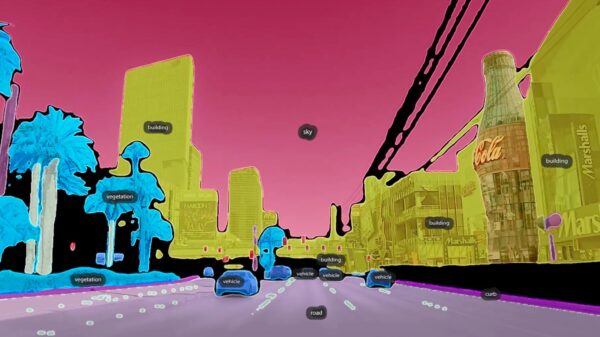Systems Of Power
Polka-Dot Boy
Focusing on a boy who finds dark spots covering his arms, Sarina Nihei’s narrative expands into a vast conspiracy.

Sarina Nihei’s break-out animated short, Small People with Hats (2014), presented a world of murderous corporations and mysterious assassins. In Polka-Dot Boy (2020), her most recent production screening at Filmfest Dresden this week, she draws the viewer into an equally surreal environment, one of strange cults, corruption, and slapstick.
Focusing on a young delivery boy who finds dark spots covering his arms, Nihei’s narrative expands into a vast conspiracy, one that links our sickly protagonist to a network of people affected by strange illnesses. At its centre is a secretive cult, hidden within the rooms of the city hospital, somehow responsible for our hero’s fate. Meanwhile, a woman plans murderous revenge for her childhood abuse at the cult’s hands. At the same time, a young girl begins to lose control of her legs. The short’s comedy lands somewhere between farce and body horror. In one scene, the girl’s legs seize up, sending her flying to the floor. In response, she pulls a syringe from her pocket, stabs it into her leg, and swigs a bottle of spirits until passing out. In another scene, the Polka-Dot Boy’s hands shake and wobble violently while eating pea soup.
The film’s narrative shares the brooding paranoia of a Thomas Pynchon novel (The Crying of Lot 49), with a similar ambience of anxiety and crazed conspiracy. As with the latter’s work, Nihei has a clear interest in systems of power, a fascination that is woven through her films thus far. This is found in the chaotic organisations in Small Men with Hats, in which bureaucrats depend on a boss who is permanently drunk, and plan assassinations by playing dice games. In Polka-Dot Boy, the cult leader uses similar gambling techniques and games of luck, selecting sacrifices and participants for their shadowy plans. Clothed in pristine robes, and standing in orderly lines, the cult represents something more business-like and co-ordinated than the sixties image of a Manson-style commune.
The Polka-Dot Boy’s world is sterile and decaying, a city filled with fading grey shop fronts, like the bakery where he spends his paper-round wages. Elsewhere are hints of societal collapse. A girl watches a TV screen in a shop window, staring at a news report warning of murder and terror attacks. Despite this gloomy exterior, the film’s mission never deviates too far from the business of delivering gags, taking delight in its purposefully tangled plot.
As the director has hinted towards in interviews, her comedic taste draws from the surrealist figureheads of Estonian animation. Felt throughout the short is the anarchic influence of Priit Parn (Breakfast on the Grass), or Janno Poldma (Birthday). Similarly, Nihei’s approach to architecture, with the city’s imposing and orderly buildings, has hints of the Eastern Bloc’s brutalist structures. Like the masters of Estonia, the film’s comedy is created through meticulous choreography. The Polka-Dot Boy runs across the screen only to stop rigidly, his complete stillness broken by sudden movement. Nihei reduces her character’s performances to the body, leaving their faces frozen and mask-like. The three main players are almost expressionless for the film’s entirety.
Another of the film’s comedic touchstones could be Jacques Tati, perhaps most prevalent in the short’s precise soundscape, designed by Horret Kuus. Like Tati’s Playtime (1967), the hospital hallways of Polka-Dot Boy have an eerie silence, broken by the marching footsteps of medics and cult leaders. The machine-like sounds of the patient’s waiting room are a particular highlight, with the ordered shuffling of feet, and the clockwork pattern of doors closing and opening. In Tati’s world, what waits behind closed doors is boring and drab, while Nihei’s film suggests something far more cruel and more surreal. Memories from the characters’ pasts are hinted at through sudden flashbacks and cryptic images, always accompanied by a blaring horn section, both parodying the film’s own preposterous twists and adding genuine unease. While he sleeps, the boy is haunted by the image of a couple lying face-up on a kitchen floor, covered in strange dot-like splotches (his parents perhaps?). Even more disquieting are the revelations of the abuse suffered by the revenge-seeking woman, revealed through scenes of a captive girl being doused in water.
As the various strands of their pasts intertwine, the narrative propels towards a fantastically gory finale, executed with all the pristine, acrobatic violence of a Shaw Brothers samurai film. While as other-worldly as the preceding scenes, the concluding moments have a very real sense of righteous anger, a collective of people confronting the perpetrators of their suffering. The images that open and close the film are revealing of this progression towards anger. The film moves from the boy’s hands, placed peacefully on a waiting room chair, to the final close-up, his clenched fist, ready for retaliation.
Within the world of animated cinema, Nihei occupies a corner that is completely her own. Absurd and comedic, with an edge of dark humour that depicts hidden structures of power, both surreal and horrifying. Her vision of urban environments, full of hidden networks and corrupt organisations, is one that expands with each new work. With the increasing complexity of her shorts, she places herself alongside a roster of maximalist animators creating intricate micro-worlds, such as Jack Wedge (Goodbye Mommy) and Yoko Yuki (See Ya, Mr Banno!). The question is always how far an animator can push this particular artistic vision, but from the evidence of Polka-Dot Boy, Sarina Nihei is a filmmaker who will be restlessly pushing the boundaries for a long time to come.





There are no comments yet, be the first!